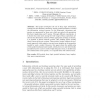Free Online Productivity Tools
i2Speak
i2Symbol
i2OCR
iTex2Img
iWeb2Print
iWeb2Shot
i2Type
iPdf2Split
iPdf2Merge
i2Bopomofo
i2Arabic
i2Style
i2Image
i2PDF
iLatex2Rtf
Sci2ools
ECIR
2009
Springer
2009
Springer
Graded-Inclusion-Based Information Retrieval Systems
This paper investigates the use of fuzzy logic mechanisms coming from the database community, namely graded inclusions, to model the information retrieval process. In this framework, documents and queries are represented by fuzzy sets, which are paired with operations like fuzzy implications and T-norms. Through different experiments, it is shown that only some among the wide range of fuzzy operations are relevant for information retrieval. When appropriate settings are chosen, it is possible to mimic classical systems, thus yielding results rivaling those of state-of-the-art systems. These positive results validate the proposed approach, while negative ones give some insights on the properties needed by such a model. Moreover, this paper shows the added-value of this graded inclusion-based model, which gives new and theoretically grounded ways for a user to easily weight his query terms, to include negative information in his queries, or to expand them with related terms. Key words: I...
Related Content
| Added | 17 Feb 2011 |
| Updated | 17 Feb 2011 |
| Type | Journal |
| Year | 2009 |
| Where | ECIR |
| Authors | Patrick Bosc, Vincent Claveau, Olivier Pivert, Laurent Ughetto |
Comments (0)

